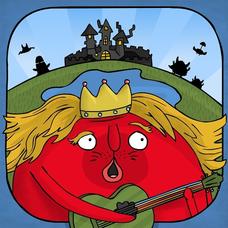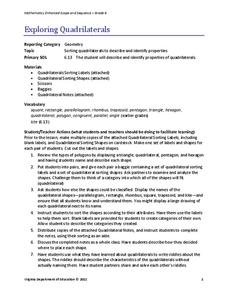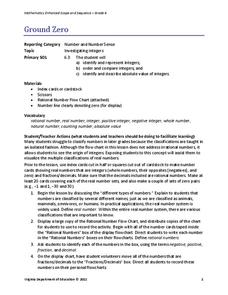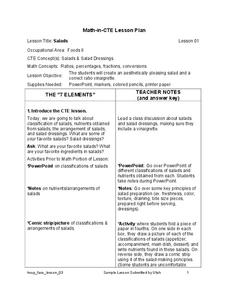CK-12 Foundation
Polygon Classification in the Coordinate Plane
Classify this resource into the "Use" pile. Scholars use an interactive coordinate plane to plot polygons given coordinates for the vertices. They use properties to classify each polygon and answer a few challenge questions regarding the...
iMagine Machine
The Land of Venn - Geometric Defense
Young mathematicians use their geometry skills to save the Land of Venn in an engaging math game. A fun way to reinforce children's understanding of basic geometric figures and shapes.
Virginia Department of Education
Classifying Angles
Don't be obtuse, this geometry unit is the just the right resource for educating the acute young minds in your class. From classifying and measuring angles, to determining the congruence of shapes, this...
Scholastic
Study Jams! Edges, Faces, Vertices
Before determining the classification of a three-dimensional shape, you need to know about the characteristics of a vertex, edge, and face. Go step-by-step using a prism, and discover what each aspect refers to and how it applies to...
Scholastic
Study Jams! Classify Quadrilaterals
Face the vertex of two-dimensional shapes and discover what each figure requires as part of its classification. With one shape per slide, learners see what makes each shape special and compare it to others with similar qualities.
CK-12 Foundation
Polynomials and Factoring: Classification Table
It all depends upon the terms. Pupils use the interactive table to sort polynomials. The scholars determine the names for the types of polynomials based on the number of terms.
CK-12 Foundation
Polygon Classification
Polly want a polygon? Young mathematicians sort shapes using an interactive. They classify the shapes as convex polygons, concave polygons, or not polygons.
Virginia Department of Education
Exploring Quadrilaterals
Sort this resource into the Use pile. Scholars investigate attributes of quadrilaterals and then use the results to sort and classify the shapes labeling each figure with their properties to justify the classifications.
Virginia Department of Education
Ground Zero
Don't harbor any negative feelings toward negative numbers. Scholars learn about different classifications of rational numbers, including negative integers. They also develop definitions of the opposite and the absolute value of a...
CK-12 Foundation
The Real Numbers: Number System
Get real about learning the real number classification. Young mathematicians create a graphic organizer of the real number system using an interactive. They answer a set of challenge questions on the classifications of real numbers.
Centre for Innovation in Mamatics Teaching
Area, Perimeter and Volume
Develop young mathematicians' knowledge of two- and three-dimensional shapes with this geometry workbook. From learning about the classifications of different shapes and figures to calculating their area, perimeter, and volume, this...
Digging Into Math
Classifying Triangles
Young mathematicians explore the world of three-sided shapes in this instructional activity on the different types of triangles. Starting with a general introduction to classification using Venn diagrams, children learn how to...
Nuffield Foundation
Angles
Your learners practice the foundations of measuring two-dimensional angles. As well as the explanation of how to measure angles and their classifications, learners have plenty of practice problems on this worksheet.
CK-12 Foundation
Venn Diagrams: T-Shirt Mystery
Sorting your t-shirts is easy with Venn diagrams. Individuals use a drag and drop interactive to classify shapes on t-shirts into Venn diagrams. A set of challenge questions tests whether the classification is correct.
Texas Woman’s University
Patterns, Patterns Everywhere!
Not only is pattern recognition an essential skill for young children to develop, it's also a lot of fun to teach! Over the course of this lesson, class members participate in shared readings, perform small group...
Habits of Mind
Haileybury Habits of Mind Learning Resource Book
Imagine a learning community committed to using Costa and Kallick's Habits of Mind as the basis of curriculum design. The resource book is packed with lessons that are designed for and identify the standards and...
National Science Teachers Association
Hop into Action
Young scientists find out what makes amphibians such unique and interesting animals in this simple life science lesson. After looking at pictures and discussing the characteristics of amphibians, learners complete a series...
National Research Center for Career and Technical Education
Salads
Lettuce talk for a moment about your culinary scholars; do they have what it takes to create a great salad? Show them the finer points of salad preparation with a career and technology lesson that combines direct instruction, creativity,...
Curated OER
Volcanoes: Fourth Grade Lesson Plans and Activities
Young geologists begin exploring volcanoes of different structures and states: active, extinct, or dormant. During the lab, they make three models and compare different types of volcanoes, including composite, cinder cone, and...
National Woman's History Museum
Getting with the Program
A seven-step lesson introduces the emergence of computer sciences and the contributions women made to the profession after World War II. Several science experiments offer pupils a hands-on learning experience that showcases parabolas,...
Other popular searches
- Blooms Taxonomy Math
- Bloom's Taxonomy Math
- Using Taxonomy Math
- Using Blooms Taxonomy Math
- Using Taxonomy Math Lessons
- Blooms Taxonomy Lessons Math
- Blooms Taxonomy Math Median
- Using Blooms Taxonomy in Math
- Bloom's Taxonomy Math Quilt
- Bloom's Taxonomy Math Lesson


















